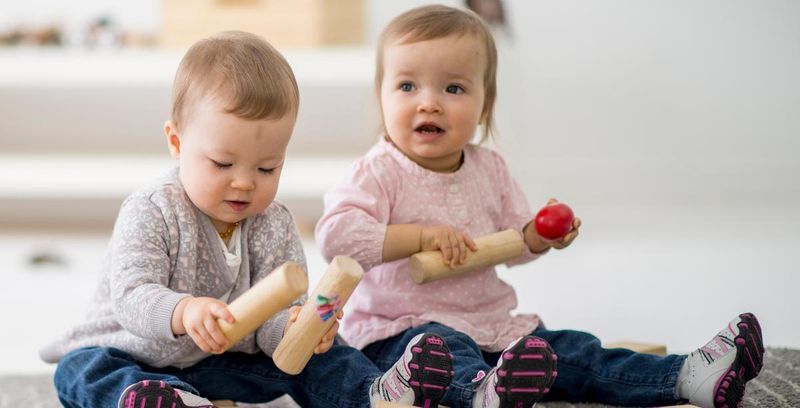
While interacting with your newborn might seem like a one-way street at times - cue endless hours of singing, chatting and playing peek-a-boo while your baby stares blankly back at you - your efforts are forming a crucial part of their early learning experience. Indeed, there's actually a lot more going on inside that little mind than meets the eye.
The first few years of life is when the most rapid brain development occurs, with more than one million neural connections forming each second. In fact, science tells us that a child’s experiences from conception through their first five years will go on to shape their next 50. The experiences your child has as a baby and toddler are literally laying the foundation for their intelligence in later life.
"Babies have an amazing capacity to learn. One of the most exciting advances in child development has been the discovery that babies actually learn before they are born," says Dr Lin Day, founder of Baby Sensory (visit www.babysensory.ae to find classes in the UAE). "Even more amazing is the fact that during the first year, babies learn more than at any other time in their lives. By the first birthday, the baby's brain has doubled in volume as a direct result of the trillions of connections made between the brain cells. This is why it is so important to introduce a rich variety of sensory experiences at every possible opportunity."
Although genes provide the basic blueprint for a child’s intelligence, their experiences influence how and when such genes are expressed. Some of the most important experiences that will shape the architecture of a baby’s brain come from their interactions with significant adults in their lives. This is why the activities you do with your child when they are little are so important. Babies naturally reach out for interaction through babbling, facial expressions and movements. The adults caring for them respond in kind with sounds and gestures. This back-and-forth process, known as ‘serve and return’, plays a vital role in developing the wiring of the brain. Studies have shown that children who miss out on this sort of nurturing in the early years of life will have smaller brains – they literally will not develop the foundational cells upon which certain areas of intelligence and emotion can be built.
But you don't need a degree to take on the role of teacher to your tot. Helping them learn is easy when you know what activities are most effective at different ages and stages. Get a head start with these expert tips for everyday activities that will make a real difference to their learning.
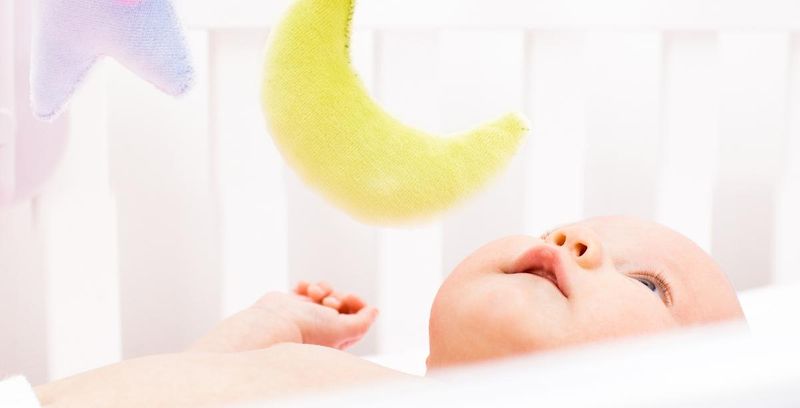
Newborn to 6 months:
Be a chatterbox
It may seem obvious, but make sure you talk to your baby a lot. "They can associate with your voice and it can encourage language development later on," says Monica Valrani, chief executive officer, Ladybird Nursery Dubai.
She adds, "Read to your baby for the same reason. Parents also need to focus on social and emotional development at this age, so cuddle, hold and play with your baby often."
Dare to explore
"Babies love activities that offer opportunities for exploration, discovery and problem-solving," says Dr Day. "Materials such as sand, water and dough offer endless opportunities for finding out about the special properties of each material. Other examples include boxes with lids to open and close, containers of different sizes and shapes, coloured bricks to stack or knock down and nesting cups to build and nest."
Toys with texture
"We love to fill sealed pouches with squidgy, gooey substances that feel nice to squeeze," says nursery director Susan Roberts.
"Likewise, there are many wonderful baby toys with scrunchy, squeaky and soft parts to enable your little one to appreciate different textures. This helps baby to develop his or her sense of touch," she adds.
Try tummy time
"Babies need to be on their tummies in order to go through the fundamental movement patterns - raising the head, creeping, and crawling - that stimulate both sides of the brain and lay the foundation for reading and writing," says Dr Day. "If the crawling stage is avoided, they may encounter learning problems in school, no matter how intelligent they are." She adds, "The good news is that even five minutes of tummy time a day can lessen or eliminate these potential problems and have a positive effect on head shape."
To make tummy time even more fun, try placing a ball in front of baby within easy reach. As soon as he touches the ball, it will roll away. Baby will either 'swim' on his tummy or lift himself up on his forearms in an attempt to reach it.
Break into song
"Music can act as a stimulus to 'wire up' the brain more rapidly and speed up a child's mental development," says Caroline Crabbe, the general manager at Jo Jingles (www.jojingles.com). "Music can also help significantly with language development in small children."
It can be useful to incorporate music into your daily routine - lots of children love singing at bath time, or enjoy a favourite song at nappy-change time. "Don't worry if you are not the world's most competent singer, just be enthusiastic and they will love it," says Caroline.
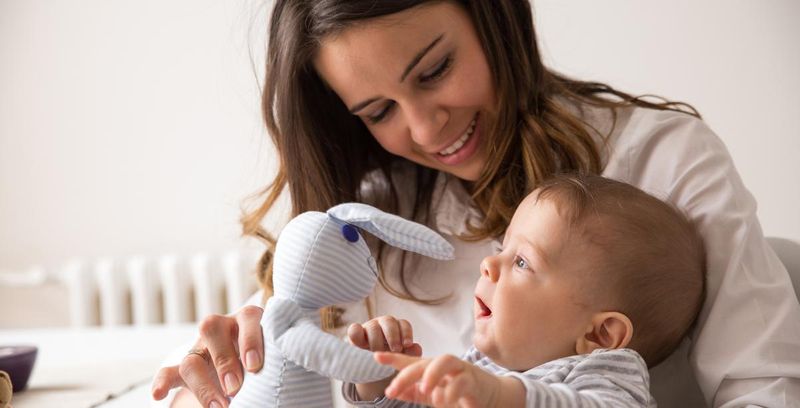
Read the signs
Signing, which can be learned from around five to six months old, offers a fab insight into your little one's world before they start to speak.
"Baby signing is the use of simple gestures - or signs - in conjunction with speech to enable young children to communicate what they may need or want before they are able to utter their first words," says Katie McLean, founder of Katie Jane Dubai, which offers baby sign language classes (Katiejanedubai.com).
"From the age of around seven months, babies' hand muscles are sufficiently developed to enable them to sign. The benefits become apparent as you start to see your baby responding to simple gestures. This, in turn, creates a more engaging caregiver through increased eye contact, interactive activities - signing to songs and stories - and an intimate understanding of your baby's needs."
When your little one reaches toddlerhood, he or she can even use signing in conjunction with speech - talk about layering up the learning!
Get some face time
"Babies love to look at faces, particularly their own beautiful faces," says Susan. "This is because they are in the early stages of responding to facial movements and expressions, which relates to their personal, social and emotional development. We ensure we have mirrors at baby's level so that they always have the opportunity to see themselves as well as plenty of face-to-face time with their carers and other children. Plus, we talk to baby about their eyes, nose and mouth, and include songs and games."
Be a masseuse
"Giving your baby a regular massage helps to soothe and reassure them and aids the bonding process but it can also help stimulate their brain development in many ways," says Cheryl MacDonald, yoga elder and founder, Yoga Bellies (www.yogabellies.com). "Any sensory stimulation helps speed up myelination of the brain and nervous system.
“The myelin sheath is the protective covering around baby's nerves. When a nerve is fully insulated, it speeds up the transmission of impulses from the brain to the rest of the body. As babies are not born with fully coated nerves, any skin stimulation from baby massage assists this process."
Essentially, this improves baby's brain-body communication. "As most of baby's major brain connections are made in the first three years of their life, by improving the efficiency of the baby's brain's communication, we can dramatically increase their learning capability," she concludes. You can start baby massage from day one - even for healthy pre-term babies.

6 months to 1 year:
Experiment with movement
"Action songs and rhymes are great fun at this age," says early childhood expert Susan Roberts. "Your child will learn to clap at around six to eight months, which allows them to take part in lots of new action songs. Encourage activity, as this is how their bodies will develop. Soft-floored play areas are a great way for allowing your child to safely try out their new-found gross motor skills."
Get a head start on maths
"There are many opportunities to introduce babies to the sounds of numbers from an early age," says Baby Sensory's Dr Day. "For example, putting pegs in their respective holes on a pegboard and counting each one in turn introduces babies to 'one to one correspondence' - matching a number to a specific object. Although one-to-one correspondence might not happen until the second year, giving babies the opportunity to experience maths through play helps them build interest for future learning. They also gain an understanding of order, for example knowing that two comes after one and that four comes after three and so on."
Messy play
"Creativity is all about mess at this age but that's all part of the fun," says Susan. "To introduce your little one to the idea of mark-making, try using yogurt - coloured with the smallest drop of food colouring - as paint. Some children will use their hands, feet and maybe even their elbows and knees to try this out. Our infant class children also love to get their hands into coloured spaghetti and jelly as a safe, messy play activity."
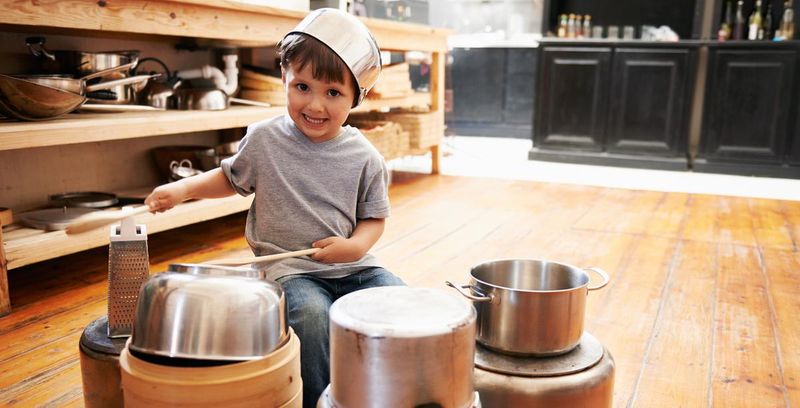
Get your groove on
"Engaging in musical experiences together creates connections in the brain that help children solve maths problems in later life," says Dr Day. "The beat of a musical piece also relates to number concepts. Examples include clapping and patting to a beat, banging on a pot or drum and bouncing to a beat. Even eight month old babies can predict when to bounce."
Action songs that introduce a pattern or sequence might include Pat-a-cake, If you're happy and you know it and Head and shoulders, knees and toes.
Perfect the pincer grip
"Towards the end of the first year, babies enjoy activities that encourage use of the pincer grip," says Dr Day. "Peg boards, shape sorters and simple puzzles with two or three shapes, stacking towers and scribbling crayons and paper encourage babies to explore spatial relationships and form the foundation for geometry and numbers. Spatial awareness is still developing, however, which is why babies find it hard to post a shape in the respective hole or put a jigsaw piece in the correct place."
Bang the drum
"Invest in some percussion instruments or make your own - rainmakers, bells, maracas, tambourines and castanets are all available from local toy shops," says Jo Jingles' Caroline Crabbe.
Alternatively, improvise! Bang yogurt pots together, fill a shampoo bottle with dried peas to make a shaker, use two saucepan lids to make a fantastic pair of cymbals.
"Props are also a fun element of music making," says Caroline. "Why not hide behind scarves while singing a peekaboo song, use soft farmyard toys for Old McDonald or liven up The Wheels on the Bus by using streamers with the actions? Try showing your child pictures to accompany the songs they are singing, so that they understand the concepts more quickly."
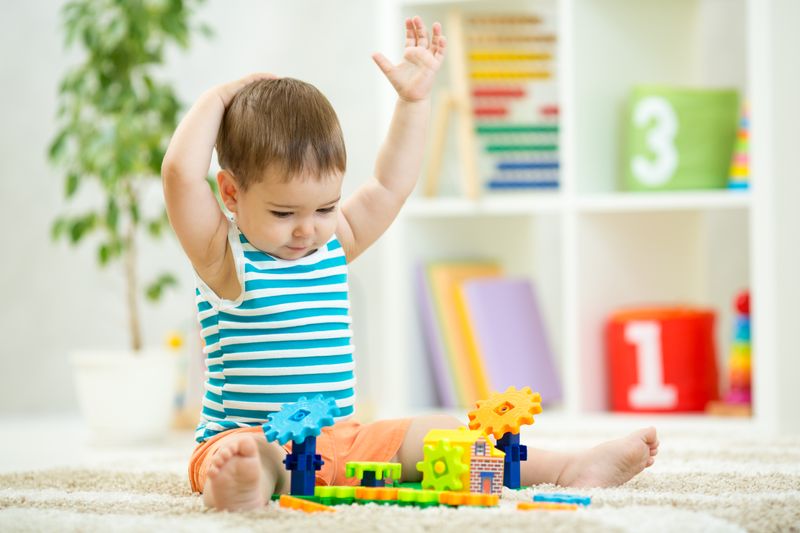
Age 1 year to 18 months:
Crunch the numbers
"Pointing out numbers on doors, on the telephone and on the clock face help babies understand how numbers can be used practically," says Baby Sensory's Dr Day. "Counting and touching fruit, toys, shapes and pegs helps babies see that you are counting one thing at a time.
As well as being fun, number rhymes introduce babies to the sounds of numbers and enable babies to learn patterns and sequences."
Songs of choice include One, two, three, four, five, once I caught a fish alive and Five currant buns in the baker's shop while books like The Very Hungry Caterpillar and Five Little Ducks can be used to reinforce number sounds and introduce the idea that numbers relate to different amounts.
Motor on
Toddlers are developing their gross motor skills at this age, so introduce big blocks, large wooden puzzles and shape-sorting activities," says Monica Valrani. "Read daily and develop your toddler's language by repeating words and expanding their vocabulary. Encourage independence by allowing them to feed themselves."
Touchy-feely book time
"At 12 months old, children often sound as though they are speaking a different language," says Susan Roberts.
"They are able to imitate the inflections of speech, sometimes in an almost grown-up way, but the words are not yet there.
"At this age, your little one is soaking up vocabulary like a sponge and while they may not be saying many words yet, they are understanding more and more."
Susan adds that story time is a great source of new words and children love to listen. "This can be a bedtime routine with a parent or an activity at nursery with their teacher. Touchy-feely books are great at maintaining a young child's attention while still picking up new words and phrases."

Age 18 months to 2 years:
Play grown-ups
"Imaginative play is a wonderful way for children who are observing the actions and social interactions of grown-ups to make sense of what they see," says nursery director Susan Roberts. "We have role-play areas within our classrooms so that children are able to express their view of the world. As well as assisting in the development of the child's social and emotional development, imaginative play also encourages development in communication."
Encourage some self-care
"Children at this age can perform some simple self-care tasks such as washing their own hands and eating with a rounded spoon or fork," says Susan. "These activities also help to develop the child's fine motor skills."
Join a playgroup
As well as being loads of fun, playgroups are great for building skills. While it is tricky to do during the pandemic, try to identify a small ‘bio-bubble’ of friends’ children to see regularly, or find a COVID-compliant baby class or soft play session. While your child is busy scrabbling in the sandpit or painting a masterpiece, he or she will also be picking up valuable new skills and experiences. These include learning to play with other children, experiencing new play and art opportunities, finding out more about the world and other people, experiencing books and music and improving problem-solving abilities.
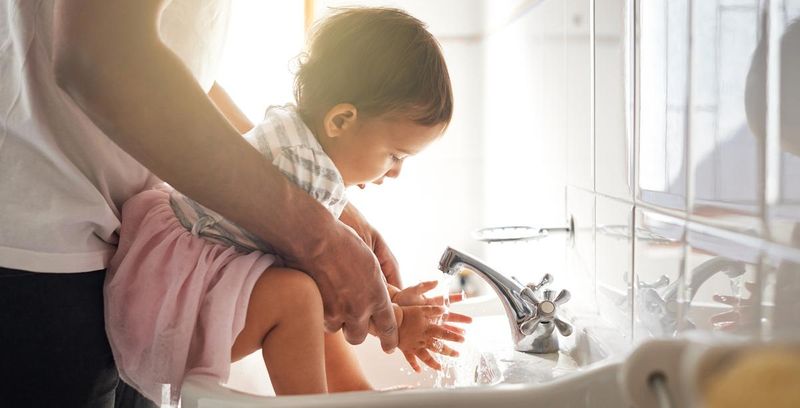
Age 2 to 3 years:
Beach days
Kids in this age bracket have lots of questions and it may seem that almost every waking hour is a chance to learn or practice a skill. Take the opportunity to teach, but also for them to explore. Take a trip to the beach, for instance, and discuss as much as you can about the sea, water, sand, fish and the surroundings. Gather seashells to take home or for show and tell. Once home, set up a 'practical life' seashell-washing station with a bowl of soap water, small scrubbing brush and tea towel for drying. Leading by example, wash and dry the shells together.
Bilingual babies
The best time for a child to learn another language - alongside mastering their native tongue - is from birth to three years old.
"The earlier you introduce a second language the easier it will be for your child to pick up its unique sounds," says Nadia Wehbe of Baby Arabia, which offers language programs for kids at soft play centres around the UAE. "The ability to hear different phonetic pronunciations is sharpest before age three and we lose the capacity to hear and produce certain sounds if we aren't exposed to them early on. Learning a few words in a second language will give your child essential tools for appreciating it now and learning to speak it later."
Inspire independence
"Language has started to develop significantly at this age so read together, listen to songs and nursery rhymes and encourage imagination by telling stories," says Ladybird Nursery Dubai's Monica Valrani. "Also introduce number and alphabet puzzles, develop fine motor skills such as pouring and spooning, and encourage independence by allowing the child to dress himself, wear his shoes and tidy up."
Development of social skills is important too. "Encourage play with others so they learn how to share and take turns and also socialise with children their age," says Monica.
Create a cosy reading corner
"Keep a wide selection of your child's favourite books within their reach and consider adding a soft pillow and some warm lighting to encourage independent reading," says childhood development expert Dr Jody LeVos.
A creative space
"Set up a small table with access to scrap paper, drawing tools, mixed materials and glue," says Dr Jody. "Have a space where your child can display his or her work, such as on a cork board. Consider taking photos of your child's work and storing it on an app or photo-sharing site so that you can frequently rotate through your child's creations and never feel like you're 'throwing away' their hard work."
Get back to nature
"Children love real, natural experiences," says Susan Roberts. "We love taking the children out to our gardening area, where they can plant and water seeds after raking the soil. It's not the cleanest activity, but it helps to develop skills in caring and nurturing and understanding the world around us.
"We don't all have such big gardening spaces at home, but planting in pots can be just as fun."
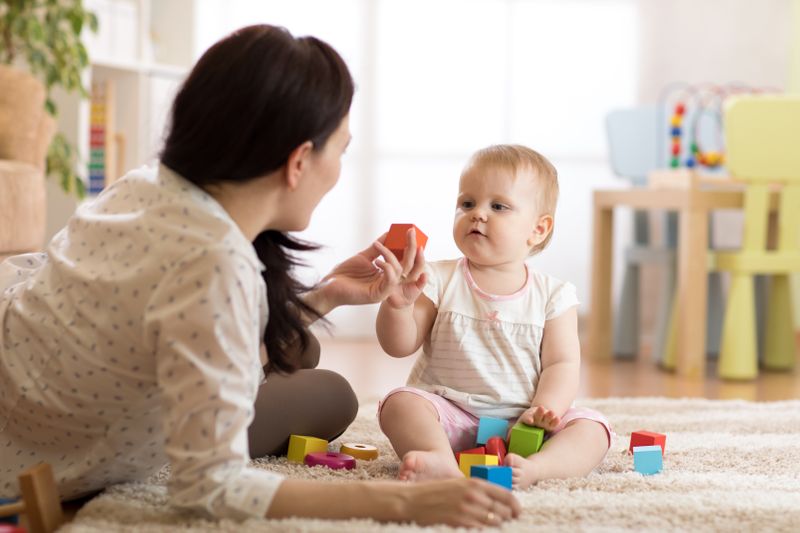
Age 3 to 4 years:
Join the band
"Playing instruments, dancing, clapping and using movement in simple action songs can help with your child's motor skills and develop general coordination," says Jo Jingles' Caroline Crabbe. "Try to incorporate movement or dance around the room while the song plays."
Play hard
"Parents are still important in developing play, but there is a move towards greater involvement of other children at this age," says British child psychologist Dr Angharad Rudkin. "Children can now start to play in larger groups of about three to five children. Initiate a mixture of functional play with objects and role play, with a predominance of role play. Play becomes more cooperative around the age of four."
Count your lucky stars
"Show your child how numbers apply to everyday life," says child development expert Abu Jarad. "Count things, point out numbers, and involve your child in counting activities as you go through your day. Have your child help you prepare ingredients for a recipe by measuring and counting the number of cups or spoonfuls, for instance. Talk about how things or amounts are more, less, bigger or smaller and be sure to praise their efforts and their progress in maths awareness."
Go global
"Keep a map or globe within eyesight," says Dr Jody LeVos. "You can use this as an opportunity to talk about places to travel, culture and food, geographic landmarks, where members of your family live, and even tie it to current events."
Write on
"We love to use fun sound games with the children to help them develop an awareness of the first and last sounds in a word," says Susan Roberts. "In small groups, we use a variety of familiar objects and ask a child to find the object beginning with an 'ssss' or 'aaaa', for instance. This is similar to an 'eye-spy' game but using phonics sounds rather than letters and limiting the possibilities to a selection of objects.
"We learn letter formation using sandpaper letters, whereby the children follow the textured letter with their finger under the guidance of an adult," she adds. "The touch sense acts as sort of cognitive 'glue' for the senses of hearing and seeing, allowing the child to take in this information with ease, while having a pleasant experience."
